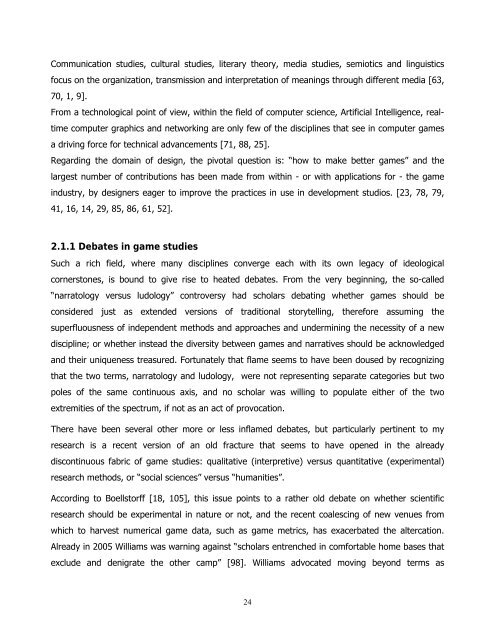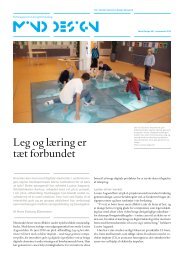Play-Persona: Modeling Player Behaviour in Computer Games
Play-Persona: Modeling Player Behaviour in Computer Games
Play-Persona: Modeling Player Behaviour in Computer Games
You also want an ePaper? Increase the reach of your titles
YUMPU automatically turns print PDFs into web optimized ePapers that Google loves.
Communication studies, cultural studies, literary theory, media studies, semiotics and l<strong>in</strong>guistics<br />
focus on the organization, transmission and <strong>in</strong>terpretation of mean<strong>in</strong>gs through different media [63,<br />
70, 1, 9].<br />
From a technological po<strong>in</strong>t of view, with<strong>in</strong> the field of computer science, Artificial Intelligence, real-<br />
time computer graphics and network<strong>in</strong>g are only few of the discipl<strong>in</strong>es that see <strong>in</strong> computer games<br />
a driv<strong>in</strong>g force for technical advancements [71, 88, 25].<br />
Regard<strong>in</strong>g the doma<strong>in</strong> of design, the pivotal question is: “how to make better games” and the<br />
largest number of contributions has been made from with<strong>in</strong> - or with applications for - the game<br />
<strong>in</strong>dustry, by designers eager to improve the practices <strong>in</strong> use <strong>in</strong> development studios. [23, 78, 79,<br />
41, 16, 14, 29, 85, 86, 61, 52].<br />
2.1.1 Debates <strong>in</strong> game studies<br />
Such a rich field, where many discipl<strong>in</strong>es converge each with its own legacy of ideological<br />
cornerstones, is bound to give rise to heated debates. From the very beg<strong>in</strong>n<strong>in</strong>g, the so-called<br />
“narratology versus ludology” controversy had scholars debat<strong>in</strong>g whether games should be<br />
considered just as extended versions of traditional storytell<strong>in</strong>g, therefore assum<strong>in</strong>g the<br />
superfluousness of <strong>in</strong>dependent methods and approaches and underm<strong>in</strong><strong>in</strong>g the necessity of a new<br />
discipl<strong>in</strong>e; or whether <strong>in</strong>stead the diversity between games and narratives should be acknowledged<br />
and their uniqueness treasured. Fortunately that flame seems to have been doused by recogniz<strong>in</strong>g<br />
that the two terms, narratology and ludology, were not represent<strong>in</strong>g separate categories but two<br />
poles of the same cont<strong>in</strong>uous axis, and no scholar was will<strong>in</strong>g to populate either of the two<br />
extremities of the spectrum, if not as an act of provocation.<br />
There have been several other more or less <strong>in</strong>flamed debates, but particularly pert<strong>in</strong>ent to my<br />
research is a recent version of an old fracture that seems to have opened <strong>in</strong> the already<br />
discont<strong>in</strong>uous fabric of game studies: qualitative (<strong>in</strong>terpretive) versus quantitative (experimental)<br />
research methods, or “social sciences” versus “humanities”.<br />
Accord<strong>in</strong>g to Boellstorff [18, 105], this issue po<strong>in</strong>ts to a rather old debate on whether scientific<br />
research should be experimental <strong>in</strong> nature or not, and the recent coalesc<strong>in</strong>g of new venues from<br />
which to harvest numerical game data, such as game metrics, has exacerbated the altercation.<br />
Already <strong>in</strong> 2005 Williams was warn<strong>in</strong>g aga<strong>in</strong>st “scholars entrenched <strong>in</strong> comfortable home bases that<br />
exclude and denigrate the other camp” [98]. Williams advocated mov<strong>in</strong>g beyond terms as<br />
24















